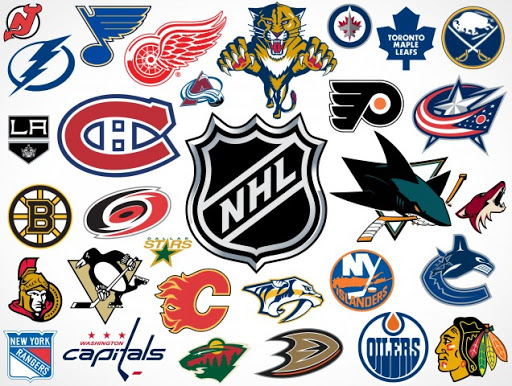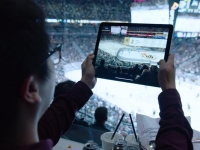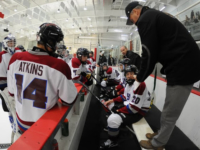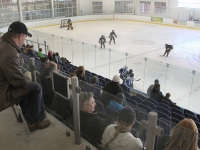The world has been changed forever by the COVID-19 pandemic, and every part of our lives are likely to be affected in some way. The unfortunate reality of the highly contagious virus is that most of us have had to cease everyday activities and change our daily habits to respect social distancing guidelines and keep ourselves safe.
The novel coronavirus has not only changed our work situations and social lives, but also the world of sports and entertainment. All active sports leagues have paused their seasons, and nobody is quite sure what to expect upon their return. The NHL particularly is in a difficult situation, as the league was primed to enter the final stretch of the regular season with many division races and wild card spots all up for grabs. The league suspended play on March 12th, and 4 players (or more at this point), have tested positive for the virus since then, and that number may still rise.
While the abrupt stop to the season is devastating for fans and players alike, it is the right choice to make in order to keep the virus from spreading. A sold-out hockey arena is a danger to any fan that enters, and the close quarters kept by teammates throughout the season keeps them at risk as well. Needless to say, this dangerous virus has already had a significant impact on the NHL and promises to cause disruptions even after it is safe to resume play.
Let’s take a look at some of the changes that have already been made as well as some potential modifications we may see upon hockey’s return.
Games Suspended Indefinitely
As previously mentioned, all NHL and affiliate games have been suspended indefinitely, with the most recent games having concluded on March 11th. In the interest of public health and safety, the NHL is complying with government orders and monitoring the situation as it plays out.
Due to the unpredictable nature of the virus and the lack of precedent, sports leagues are not able to make any promises as to the date of their return. With 189 total games remaining in the season, the league would like to finish as planned, but that is dependent on the developments that take place during the course of the pandemic.
Team Meetings and Practices Cancelled
Because the risk of spreading the virus to others is so great, team meetings and practices have also been cancelled. Fans may not always think about the impact this could have on the season, but it could lead to games being pushed further back as players might have to go through extra conditioning before their return. The league may find it to be safer to ease the players into the rest of the seasons rather than resuming immediately.
Potential Changes Upon Return
Despite everyone’s desire to get back to normal, it simply isn’t safe to do so at this time. The break in the season is bound to cause some changes if and when hockey does resume play. There might be changes to the schedule, both in the regular and postseasons, and arenas may enact new rules.
Season resumes as planned – 45 days behind schedule
This is the simplest solution that has the broadest appeal but also poses some problems of its own. The self-quarantine period would last 45 days, and regular season games would go on as planned to start on April 30th. The playoffs under this proposal would start in mid-May, with the Stanley Cup Finals likely finishing in July or even August. Usually, the Cup is hoisted in late May or early June.
The problem with this proposal is that it is dependent on the progress that is made against the Coronavirus. Public health officials will have to give the green light in order for the NHL to resume. With cases in the United States and Canada still increasing exponentially, there is no guarantee that the situation will be deemed safe by then. If the virus continues to spread, other options will have to be explored.
Games played without fans present
One option that is being looked into is that of playing games as normally scheduled but without fans in the seats. This can help the season to progress without putting hundreds of thousands of fans at risk of contracting the virus, but it comes with some drawbacks.
NHL players are still at risk of getting COVID-19, especially considering the close quarters of locker rooms and the fact that it is a physical game with a lot of human-to-human contact. A serious outbreak throughout the league could lead to devastating long-term problems for the NHL and the players.
Teams would stand to lose a lot of revenue in this situation, as previously sold tickets would need to be refunded and arenas would make no money off of food, beverage, and merchandise sales. The fan experience would be greatly diminished as well. Watching games on TV just isn’t the same as seeing them in person.
Altered Playoff Formats
While the league hasn’t officially made any announcements about potential altered playoff formats, rumors have circulated among insiders and speculators alike. The NHL postseason is notoriously long and extending it too far could create problems for the start of the 2021 season. Shortening the playoffs might provide some benefits to the league and the fans.
Some ideas include making the first round or two a best of 5 showdown rather than best of 7, similar to how Major League Baseball does it. Some extreme proposals go so far as suggesting a best of 3 format in the first round. While this would be bad news for fans, it could go a long way in keeping the league as close to schedule as possible.
No matter what happens, NHL officials remain optimistic that the season will be seen to completion and that somebody will be lifting the beloved Stanley Cup in 2020. Unfortunately, everything will be dependent on what transpires with the COVID-19 situation, but there is some room for optimism as we all fight this pandemic together.






